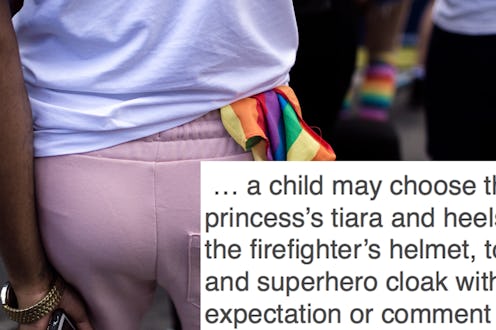Fashion
Boys Should Be Able To Wear Tutus To School, Says New Statement From The Church Of England

As transgender rights have become an international issue, a question has been raised: Will organized religions accommodate them? On Monday, the Anglican Church announced it would do exactly that. The Church of England's first statement for teachers on transgender issues, sent to its 4,700 faith schools in an effort to combat homophobic bullying, instructs authority figures in the church to allow children to "explore the possibilities of who they might be without judgment or derision." The report, “Valuing All God’s Children,” makes it clear that this freedom includes gender expression, adding that “a child may choose the tutu, princess’s tiara and heels and/or the firefighter’s helmet, tool belt and superhero cloak without expectation or comment," regardless of their gender.
The Church first published guidelines on homophobic bullying in 2014, and it has now been updated to include measures to fight transphobia and biphobia. Over the course of 52 pages, the report states that the Christian faith should not be used to exclude or judge a child's behavior "just because it does not conform to gender stereotypes or today’s play preferences." Instead, teachers should promote classrooms in which all students are treated with equal respect — a climate the Church of England says will teach the next generation to be more tolerant of people's differences. The report explains:
"In creating a school environment that promotes dignity for all and a call to live fulfilled lives as uniquely gifted individuals, pupils will be equipped to accept difference of all varieties and be supported to accept their own gender identity or sexual orientation and that of others."
In a foreword to the report, Archbishop Welby pointed out the toll LGBT discrimination takes on children. "All bullying, including homophobic, biphobic and transphobic bullying causes profound damage, leading to higher levels of mental health disorders, self-harm, depression and suicide," he wrote.
By all accounts, this is true. According to the LGBT rights organization Stonewall, 45 percent of LGBT students and 65 percent of transgender students say they have been bullied. Half say they hear homophobic insults "frequently" or "often" in school. Research consistently shows that LGBT students are more likely to have mental health problems like depression or substance abuse, and bullying can impede their ability to receive an education.
The update to "Valuing All God's Children" comes just a few months after the Church of England voted to welcome transgender parishioners and explore special services for them. The motion was controversial, with some traditionalists saying it runs counter to teachings of the Bible, and priests are still forbidden from performing same-sex marriages in the church, despite the overall legalization of same-sex marriage in the UK. However, Archbishop Justin Welby said in July that the church would begin a years-long process of reassessing its stance on sexuality.
Unfortunately, that may be easier said than done. Attitudes toward LGBT rights may be relatively liberal in the West, but that doesn't mean the church's members are uniformly accepting of LGBT rights. Speaking to the Daily Mail, Andrea Minichiello Williams of the conservative organization Christian Concern condemned the Anglican Church's new guidelines as "unkind, unloving and lacking in compassion" toward those who "step out of line." Furthermore, in 2016, the head of the Ugandan Anglican church declared homosexuality "incompatible with Scripture," and at the same time, representatives from Nigeria and Kenya reportedly considered boycotting an Anglican Summit over LGBT acceptance.
Transgender rights in particular tend to lag behind the rest of the community, but recently, they have become the subject of international debate. With their new guidelines supporting transgender students, the Church of England has set a progressive example for the world to see — here's hoping other organizations will follow suit.